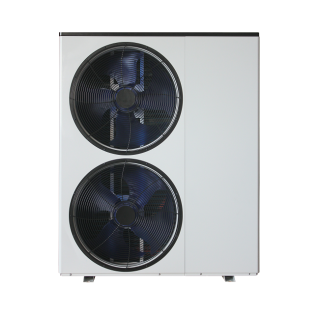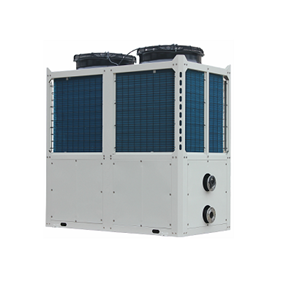Vertical commercial heat pump, strong capacity, modular installation, built-in Wifi function, Equipped with RS485 interface, remote control can be achieved through Modbus protocol
Air to Water Heat Pump Advantage
Commercial heat pumps are primarily used in large commercial buildings, shopping malls, hotels, office buildings, and other venues requiring constant temperature control, maintaining comfortable environments through stable cooling/heating capacity. Public buildings such as hospitals and schools, with high annual operational demands, are suitable for adopting high-efficiency heat pump systems. Air-to-water heat pumps are mainly applied in food processing and textile dyeing industries due to the need for high-temperature hot water (above 80℃), where air-source heat pumps can replace traditional boilers. Vertical heat pumps are also utilized in chemical and pharmaceutical industries: providing precise temperature-controlled process hot water and chilled water for reactors and cleaning equipment. Electronics manufacturing : maintaining temperature and humidity control in clean rooms. Modular heat pumps are frequently used in centralized heating/cooling systems: delivering distributed heating/cooling services to residential communities and office parks, reducing municipal energy loads. Air-source heat pumps are primarily applied in large bathhouses: continuously supplying domestic hot water with lower operating costs than gas boilers. Air-to-water heat pumps integrated with solar energy and condensing boilers form multi-energy complementary solutions, enhancing energy resilience. Key Technical Advantages of Commercial Heat Pumps High Efficiency and Cost Reduction: With a COP value of 4-6, heat pumps achieve 30%-50% energy savings compared to traditional air conditioners. Long-term use significantly reduces electricity costs. Air-source heat pumps utilize ambient heat, while water-source and ground-source models leverage water temperature regulation to further reduce energy consumption. A single system integrates heating, cooling, and domestic hot water supply, saving on equipment investment and space. Groundwater temperatures maintain stable fluctuations (15-25°℃), ensuring consistent performance in both winter and summer. Advanced air-source models support operation at-30°C low temperatures.













